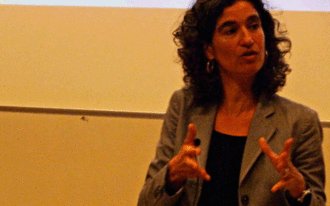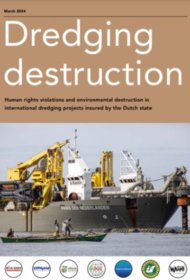Dare to dream about a sustainable economy, Daniëlle Hirsch shares her vision
"My idea of 'good' is that people can make decisions about their own development; that they are able to decide what happens to their environment. That we all respect the boundaries of our ecosystems and that women, just like men, are able to develop in the way that they want". Daniëlle Hirsch is responding to a question from the audience where she just gave a lecture on her views for a future sustainable economy.
Dare to dream
For many people, this sustainable economy is nothing but a dream, but one that has to be dreamt. Hirsch: "These days it's an act of vulnerability to share your dreams, because everyone is inclined to see them as naïve and unrealistic". By showing a video, she shows how people are blinded by the reality of here and now, and are hardly able to see the small green economies evolving all around us.
Sustainable economies: they already exist
In Niger, thousands of local farmers are regreening large parts of the Sahel. By planting trees and shrubs in one of the most dry and degraded places on earth, harvests have improved and the groundwater levels have risen immensely. In India and Peru, villagers have taken on management of their own water resources. The quality of water has improved and the division of water is much better adjusted to local production systems. But companies are also making progress; an attenuated tea plantation in Sri Lanka was brought back to life by planting the original vegetation in between the tea bushes.
Diversity
Hirsch shares her vision on sustainable economies: "I principally see a world where diversity prevails. Diversity in economic systems and social relations, but also in leadership and production systems". In Hirsch' vision, financial systems accommodate small and local producers, which makes the supply more diverse. Exhausted ecosystems are being cleverly restored, making land fertile again. The same land is being used by farmers who stay within the boundaries of that specific ecosystem. Women play an important role in the sustainable economy of Hirsch: "The large number of female decision-makers creates a balance between economic and social values. The relation between 'having' and 'being' is balanced.
The 'silver bullet' doesn't exist
According to Hirsch, we have to realise that the one solution doesn't exist, being blinded by the silver bullet that will improve the whole global system at once, will only be counterproductive. "Let's all recognise that we are improvising. Criticism is easy, what we have to strive for is giving people space to start working on different activities and solutions", says Hirsch. As an example she mentions the incubators at Philips, where a group of visionaries receive money and space to think 'out of the box' and develop innovative products.
Visionaries and new systems
It turned out that with existing actors like the WTO and the World Bank, we are not heading towards a sustainable economy. According to Hirsch, that's why we must find new actors, visionaries from the South like Leonardo Boff and Wangari Matai. The WTO and the World Bank can still be a part of this, but they will have to return to their mandate of solidarity and sustainable and social development. Hirsch: "Not until we set boundaries for our own investments, respect human rights and support local groups in standing up for their rights and ideas, will we start paving the way towards a sustainable and maintainable economy".
The 'Duurzaamheidsoverleg Politieke Partijen' (DOPP) is a sustainability consultation for political parties. The DOPP organised a second lecture series on the 8th of March called 'in search of a sustainable economy'. Next to Danielle Hirsch, other guest speakers were Myriam van der Stichele of SOMO who spoke about the future of trade agreements, and René Kleijn of the Centre for environmental science who talked about increasing resource scarcities. The next DOPP lectures are held on the 22nd of March.
Read more about this subject
-
Blog / 15 April 2024
The year of truth: EU Member States urged to combat deforestation
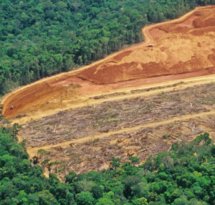
The EU is the world's largest "importer of deforestation," due to the huge volumes of unsustainably produced soy, timber, palm oil, and other raw materials that EU member states import. After many years of delay, the European Parliament and the European Council passed a law in December 2023 to address this problem: The EU Deforestation Regulation (EUDR). Both ENDS is part of a broad coalition of organizations that have been pushing for this European legislation. However, there is now a serious delay, and perhaps even postponement, of the law's implementation. Objections have been raised by a number of member states, who are sensitive to lobbying by certain business sectors and producer countries.
-
News / 4 April 2024
EU ECA fossil fuel phase-out tracker reveals EU Member States’ lagging commitment to Paris Agreement goals in export credit policies

Our new report titled EU ECA fossil fuel phase-out tracker by Both ENDS, Counter Balance and Oil Change International sheds light on the concerning lack of harmony between EU Member States' export credit climate policies.
-
Blog / 4 April 2024
If we women don't speak up, no one will speak for us
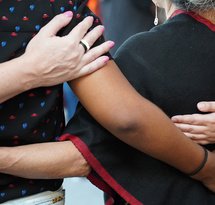 By Maaike Hendriks and Tamara Mohr
By Maaike Hendriks and Tamara MohrThis February women environmental defenders from around the world met each other in Indonesia. All these defenders face structural violence. GAGGA, the Global Alliance for Green and Gender Action, supports these women. This meeting in Indonesia provided a unique space for women, trans-, intersex and non-binary people who are often the subject of conversation but rarely have the opportunity to engage with each other and meet other defenders from around the world. For they are all amazingly knowledgeable, strong and resilient women whom we should take seriously.
-
News / 2 April 2024
The Climate lawsuit against Shell
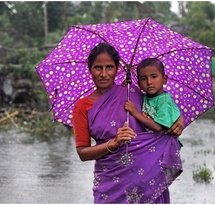
Milieudefensie (Friends of the Earth Netherlands) and 6 other organisations are confidently heading into Shell’s appeal of the 2021 climate ruling, which will take place on April 2nd in The Hague. In the landmark lawsuit against the oil and gas company, the court decided that Shell must slash its CO2 emissions by 45%, in line with international climate agreements.
-
News / 29 March 2024
Both ENDS visit Tweede Kamer to talk about destructiveness of dredging worldwide
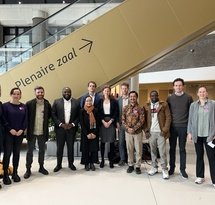
This week several Both ENDS colleagues visit Tweede Kamer der Staten-Generaal to meet Christine Teunissen and Luc Stultiens with partners from Mozambique, Indonesia and the Filippines to talk about the destructiveness of dredging worldwide and especially in projects with the aid of the Dutch government.
Read their plea
-
News / 27 March 2024
Changing of the guard: Paul Engel and Leida Rijnhout on the unique strength of Both ENDS
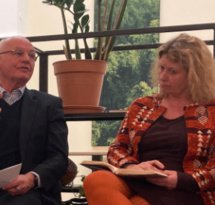
After eight years as chair of the Both ENDS Board, Paul Engel is now passing on the baton to Leida Rijnhout. In thus double interview, we look back and forwards with the outgoing and incoming chairs. Paul Engel sets the ball rolling on an enthusiastic note: “This organization decides itself what it is going to do, and does it very well. As the Board, we help and use our networks to provide support”. A conversation about taking the lead in systemic change and working with others around the world.
-
Press release / 25 March 2024
Dredging destruction; worldwide research into Dutch dredgers

Dredging Destruction: Report reveals how Dutch dredging companies are systematically destroying human lives and the environment around the world with the help of taxpayers’ money
The Netherlands is providing billions of euros in support for dredging projects by Boskalis and Van Oord around the world. All of these projects are destroying human lives and the environment. The Dutch government’s policy to protect people and planet is failing systemically. And after twelve years of studies and talking, there are no real improvements. It is time for a thorough clean-up of government support for the dredging sector.
-
Publication / 25 March 2024
-
News / 19 March 2024
Both ENDS – quite special
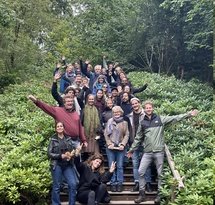
Both ENDS has no management team, hardly any team meetings and certainly no 'director who is boss over everyone'. Both ENDS has had a flat organizational structure since 2016, based on the principle of shared responsibility. This, too, reflects our goal of 'Connecting people for change'.
-
News / 12 March 2024
Equality as a key for international trade

Trade has been in the global spotlight once again in recent times. Recently, ministers from around the world gathered in Abu Dhabi at the WTO for negotiations on world trade in the coming years. However, participants from civil society were silenced. Never before has their freedom been so severely restricted at the WTO. In a time when geopolitical tensions are escalating by the day, it is crucial to prioritize equality in international trade. -
Event / 12 March 2024
From Policy To Practice: Funding Locally-led Gender-Just Climate Action
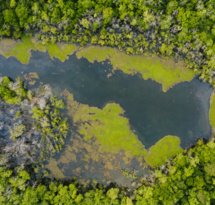
A discussion on the intersection of climate and gender justice - specifically on financing mechanisms for gender-just climate solutions!
-
News / 6 March 2024
Inspire inclusion at Women's day!
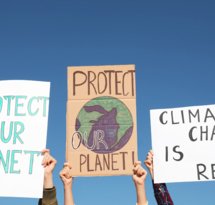
Happy Women's Day!
Friday March 8th we celebrate a gender equal world; free of stereotypes, bias, and discrimination. Around the world women are powers of change. We proudly present you; the voices of the next generation of environmental leaders of the JWH initiative. All our grantees are driving change in the environmental sector and have a strong say about the inclusive world.
-
News / 6 March 2024
Export Credit Agencies and development finance in the EU

We are seeing increased interest in the EU for blending different development financial instruments with export credits, even though export credits are not fit for this purpose. The European Commission is developing plans for using so-called export credits for financing everything from raw materials, to development projects, to weapons. A new report of Counter Balance is shedding light on the significant environmental and social impacts of projects financed by ECAs.
-
Press release / 4 March 2024
Dutch government calls for investigation into Malaysian timber certification
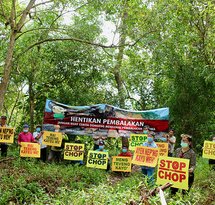
The Dutch government expects PEFC International to undertake an investigation into its own role as a forest certification system, using the Malaysian Timber Certification Scheme (MTCS). "It is about time the Dutch government takes a leading role in ensuring Malaysian timber entering The Netherlands is not associated with deforestation and human rights abuses," states Paul Wolvekamp of Both ENDS. "Considering that the Dutch government has the ambition to build 900.000 houses in the immediate future, involving massive volumes of timber, such as timber from Malaysia for window frames, builders, contractors, timber merchants and local governments rely on the Dutch government to have its, mandatory, timber procurement better organised, i.e. from reliable, accountable sources'.
-
Blog / 27 February 2024
Partners fighting for rights within natural resource exploration in Uganda
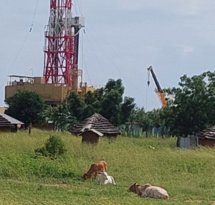
A recent visit to Uganda highlighted the country as the latest example of ethical, environmental and human rights dilemmas brought forth by natural resource exploration.
Under the guise of economic prosperity and energy security, the future of Uganda’s forests, lakes, national parks, and by extension that of the people that depend on these resources, is increasingly endangered. Both ENDS partners in Uganda work with local communities to preserve these natural environments and the livelihoods that come from it.
-
Blog / 26 February 2024
Brumadinho: 5 years without justice
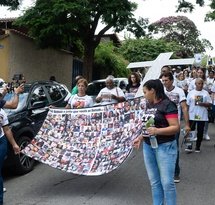
On January 25, 2019, Brumadinho region witnessed a tragedy-crime that claimed 272 lives, including two unborn children, affectionately called "Jewels" in response to VALE’s declarations that the company, as a Brazilian jewel, should not be condemned for an accident. However, the investigations about B1 dam collapse, at Córrego do Feijão Mine, showed that the scar left on the community and environment was not an accident, but VALE negligence.
-
Blog / 26 February 2024
Exploring sustainable farming practices with partners in Indonesia
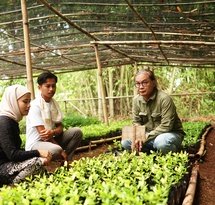
From land regeneration to improving soil health – trees play a crucial role in almost all our ecosystems. Agroforestry makes use of these benefits by combining agriculture and forestry. Agroforestry, and the reforestation and conservation efforts that are part of it, improves biodiversity and climate resilience, as well as the livelihoods of the farming communities involved.
-
Blog / 26 February 2024
Impacts of the fossil fuel sector in Guanabara Bay

Last September, together with our Brazilian partner FASE, Marius Troost of Both ENDS visited Guanabara Bay (near Rio de Janeiro) to map the impacts of the fossil fuel sector there. During the trip, he was struck by the braveness and fearlessness of the local fisherfolk who protest the injustices faced by the people who live around Guanabara Bay and about the damage done to the environment.
-
News / 14 February 2024
Petition to protect the Saamaka people and the Amazon Forest
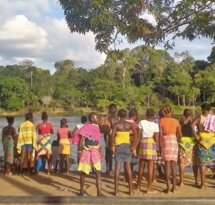
The Saamaka People, the Afro-descendant tribe of Suriname, have preserved close to 1.4 million hectares of the Amazon rainforest. They have for decades urged the government to recognise their ancestral territorial land rights.
-
News / 8 February 2024
The litmus test for the devastating race track in Lombok

A race track for international motor bike events in Lombok continues to worry human rights experts around the world. Both ENDS and its partners are increasingly concerned about the project’s implications for ethical standards in global development financing going forward for it continues to hurt the most basic social and environmental safeguards.



